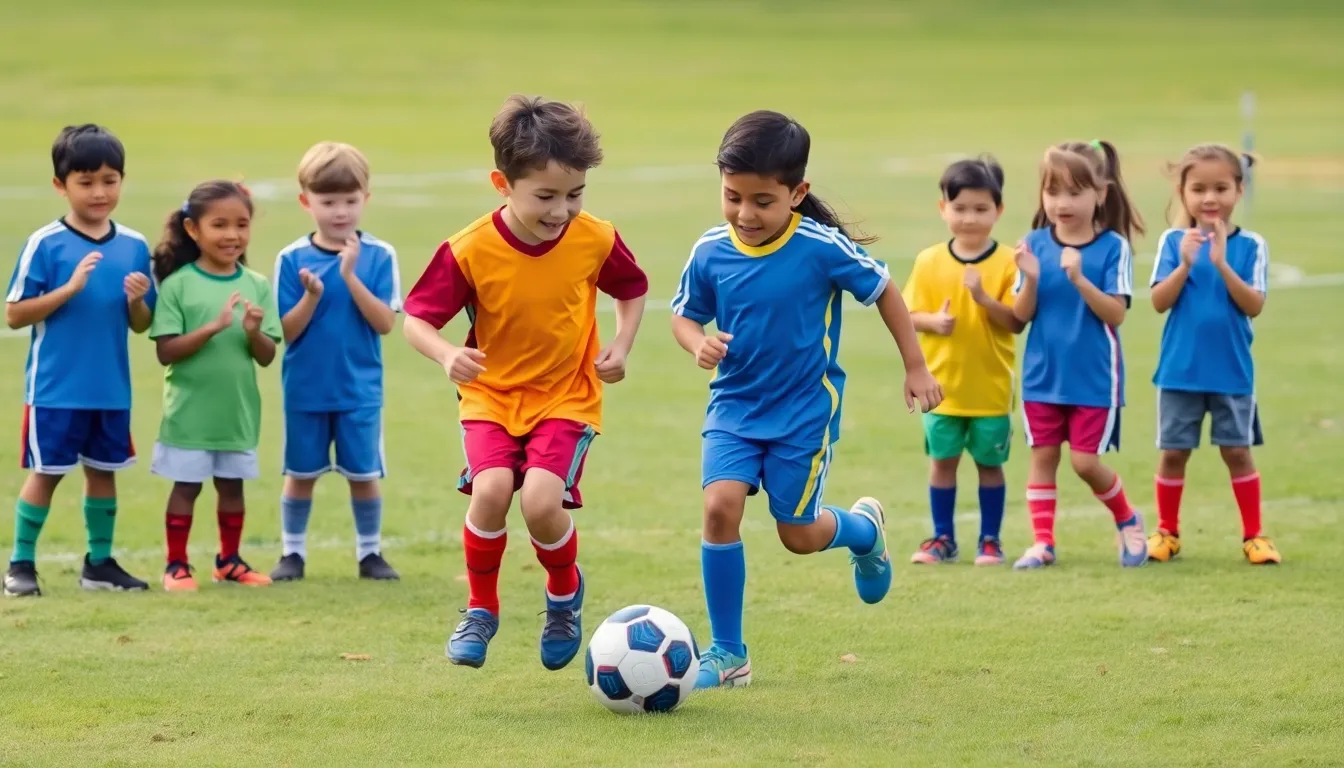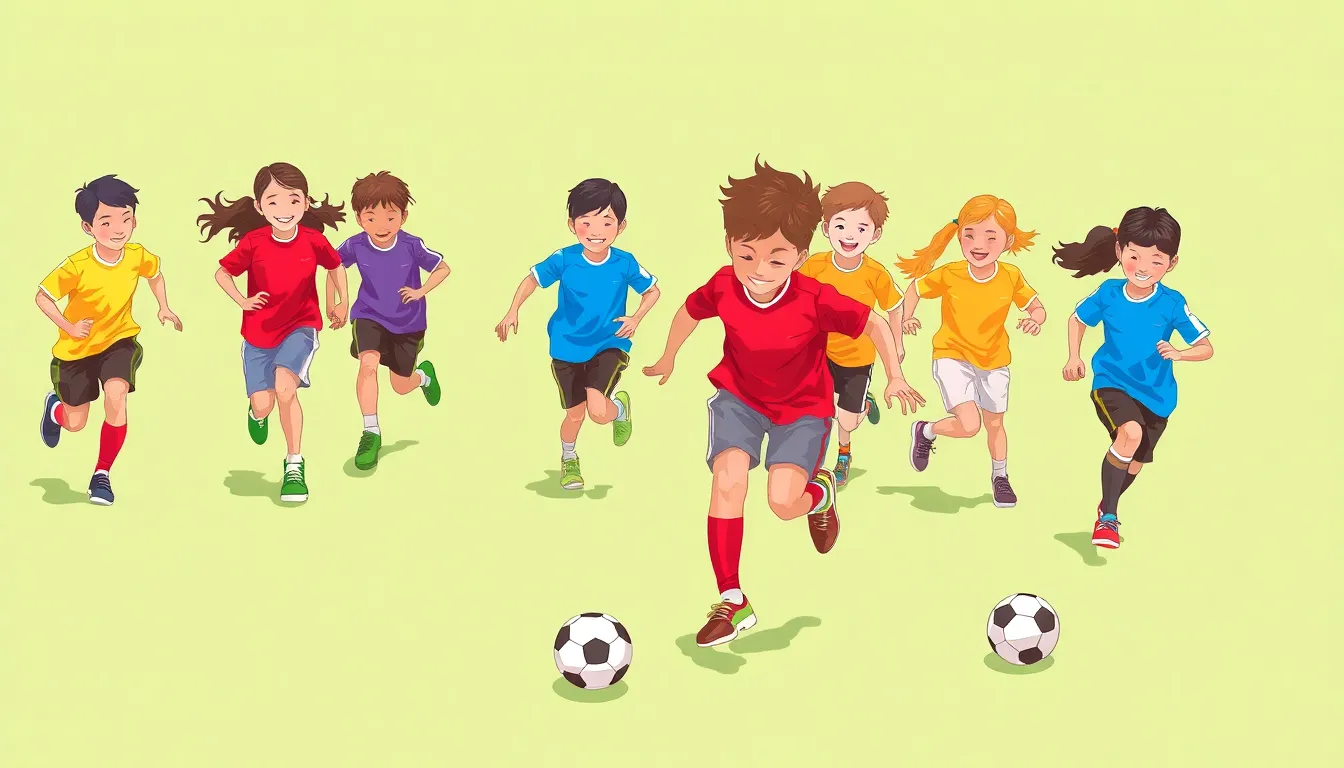Table of Contents
ToggleEvery parent knows that keeping kids active can feel like herding cats—energetic, unpredictable, and sometimes a bit too curious for their own good. Local sports for kids offer a fantastic solution, transforming that boundless energy into teamwork and skill development. Plus, it’s a great way to ensure they’re not just glued to screens all day, turning into couch potatoes with a penchant for snacks.
Importance Of Local Sports For Kids
Local sports play a crucial role in the development of children. They provide an opportunity for physical activity and foster essential skills that benefit kids in numerous ways.
Physical Benefits
Engaging in local sports contributes significantly to children’s health. Regular participation improves cardiovascular fitness and strengthens muscles. Children active in sports also gain coordination and flexibility, which enhances overall athleticism. Reducing screen time becomes easier as kids enjoy outdoor play and team activities. Regular physical engagement helps prevent obesity, as statistics indicate that children who participate in sports are 40% less likely to be overweight. Local sports programs often encourage daily exercise habits, laying the groundwork for a healthier lifestyle.
Social Benefits
Local sports offer essential socialization opportunities for kids. Through team participation, children develop communication skills and foster friendships. Being part of a team cultivates a sense of belonging, and kids learn valuable lessons in cooperation and teamwork. Local sports also teach respect for opponents and understanding of fair play. Research shows that kids in team environments are more likely to develop empathy, positively influencing their emotional intelligence. Involvement in sports can improve self-esteem, with surveys indicating that 80% of children feel more confident after team participation.
Types Of Local Sports Programs

Local sports programs cater to diverse interests and skill levels, providing children with numerous options for participation. Engaging in different types of sports promotes physical fitness and social interaction.
Team Sports
Team sports, such as soccer, basketball, and baseball, encourage collaboration among participants. These sports typically allow children to develop teamwork and communication skills. With regular practice, players enhance not only their physical abilities but also their strategic thinking. Local leagues often provide structured environments, fostering friendships among teammates. According to studies, children engaged in team sports exhibit better self-esteem, with 80% reporting increased confidence after games.
Individual Sports
Individual sports include options like swimming, gymnastics, and martial arts. These activities emphasize personal skill development and self-discipline. Children can set personal goals and track progress in individual sports, fostering a sense of accomplishment. Besides enhancing physical fitness, these sports often build resilience and self-motivation. Participation in individual sports also facilitates opportunities for one-on-one coaching, allowing for tailored skill improvement and growth.
How To Choose The Right Program
Selecting the right local sports program requires careful consideration of several factors. Evaluating age and skill levels ensures children find the best fit for their developmental stage.
Age Considerations
Different age groups may experience varying levels of physical, social, and emotional development. Programs tailored for young children, such as those aged 4 to 7, typically focus on basic skills, fun, and teamwork. As children grow, options like programs for ages 8 to 12 introduce more structured play and strategies in sports. Adolescents, ages 13 and older, often benefit from competitive environments that emphasize skill refinement and teamwork. Choosing a program aligned with a child’s age fosters engagement and enjoyment, enhancing retention and participation rates.
Skill Levels
Assessing skill levels helps ensure a positive experience in sports. Beginners often thrive in programs that emphasize foundational skills and provide encouragement. Advanced players benefit from practices that challenge their abilities, promoting their growth and resilience. Programs designed for mixed skill levels encourage peer learning and cooperation. This model fosters an inclusive atmosphere, where all participants can learn and progress. Parents should discuss their child’s assessment with coaches to ensure the selected program meets skill-specific needs.
Finding Local Sports Opportunities
Exploring local sports opportunities involves tapping into community resources and programs. Parents can start their search by looking at community centers.
Community Centers
Community centers often offer various sports programs tailored to different age groups. These programs typically focus on skill-building and enjoyment, creating a fun environment for kids. Many community centers also prioritize accessibility, ensuring that children from diverse backgrounds can participate. Parents can find leagues that promote teamwork while developing athletic abilities. Often, these programs encourage social interaction and friendships, essential for children’s development. Engaging with local community centers can lead to discovering unique sports like racquetball or martial arts that may not be widely advertised.
Schools And Clubs
Schools and clubs present additional avenues for youth sports engagement. Many schools include sports as part of their curriculum, offering after-school activities in popular sports like basketball and soccer. Clubs operate independently and can focus on specialized sports like tennis or swimming. School teams help foster school spirit and community involvement, giving children a sense of belonging. Clubs may provide opportunities for competition beyond local leagues, focusing on skill refinement and mentorship. Parents should consider both school and club options to find programs that align with their child’s interests and abilities.
Local sports play a vital role in children’s growth and development. They provide an excellent platform for kids to stay active while fostering essential life skills. Through participation in team or individual sports, children not only improve their physical health but also enhance their social and emotional well-being.
Engaging in local sports cultivates a sense of community and belonging. It encourages children to develop friendships and learn valuable lessons in teamwork and respect. Parents have numerous resources available to help find the right program that suits their child’s interests and abilities.
By prioritizing local sports, parents can significantly impact their children’s overall health and happiness. Encouraging active participation today sets the foundation for a healthier and more confident future.





